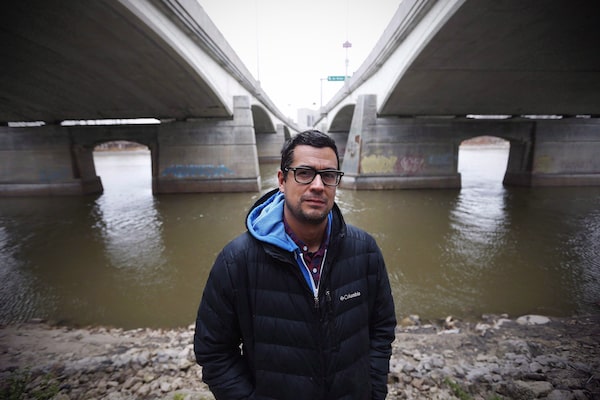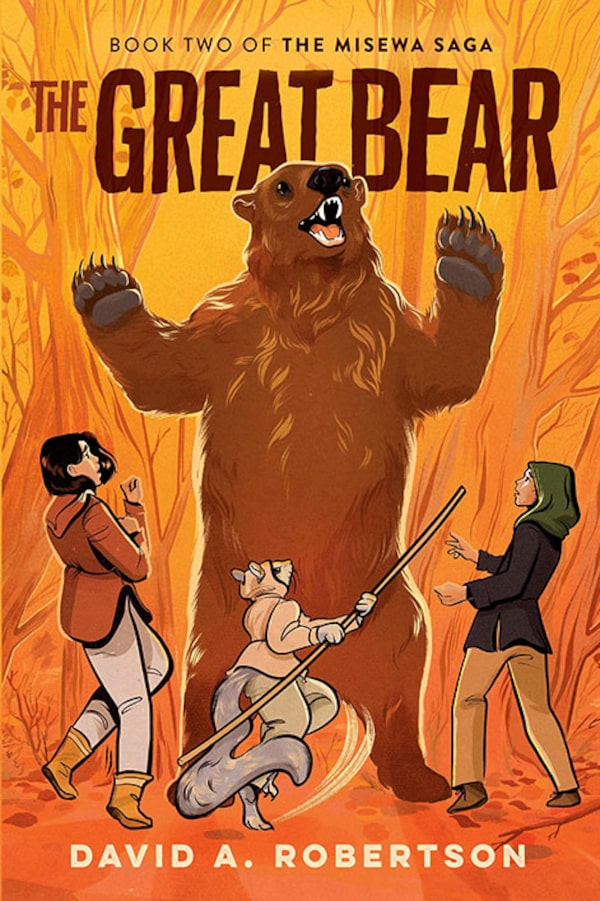
Award-winning Indigenous author David Alexander Robertson.JOHN WOODS/The Canadian Press
David A. Robertson, the award-winning Indigenous author of a children’s book pulled from library shelves in the Durham District School Board, calls a DDSB discussion of the matter a “farce.”
At its regular board meeting Tuesday evening, the DDSB discussed the controversy swirling around the temporary removal of The Great Bear from its libraries.
The meeting heard that the book is under review following concerns raised by some Indigenous families in the district, which is east of Toronto.
“When these concerns are brought forward, swift action will always be taken,” Erin Elmhurst, superintendent of Indigenous and global studies, told the meeting. The board emphasized that no final decision about the book has been made.
Robertson, who is a member of Norway House Cree Nation and lives in Winnipeg, declined to be interviewed for this story, but in tweets the Governor General’s Award-winning author expressed disappointment with the process and said he is committed to ensuring this “censorship” does not continue.
“DDSB board meeting was a farce rife with platitudes and political non-answers,” Robertson tweeted Tuesday evening. “We still don’t know why The Great Bear was pulled or what in it could possibly harm Indigenous students. I saw tonight exactly what I’ve been hearing from DDSB teachers all week. Fear and frustration.”

Handout
The Great Bear was removed from school shelves in late March. It is the second book in Robertson’s Narnia-inspired Misewa Saga, about two Indigenous children who discover a portal from their foster home into another world. According to an internal e-mail obtained by The Globe and Mail, DDSB librarians were told that it had come to the board’s attention that the book contained content “that could be harmful to Indigenous students and families.”
The board would not tell The Globe how many complaints had been made. In an interview, Elmhurst said there were concerns “that some of the messaging could potentially perpetuate discrimination” and the Indigenous families asked to have the matter investigated.
“Their concerns are for themselves and their children and ensuring that Indigenous rights are honoured,” Elmhurst told The Globe. She talked about the importance of prioritizing the concerns of original land rights’ holders in the Durham area.
DDSB trustee Linda Stone told the meeting Tuesday that she had spoken to Robertson, who said he was given approval for the book by Cree knowledge keepers. “How does the board figure out what’s acceptable and what isn’t when he was given approval from knowledge keepers?” she asked.
Said another trustee, Michael Barrett, “We’ve created a great deal of angst within a number of communities across Canada.”
In response to Robertson’s tweet Tuesday, a DDSB official accused him of harassment. “It is disappointing that you continue to harass and berate the Indigenous families who expressed concerns,” wrote Michelle Evans, an Indigenous Education Department Facilitator with the DDSB. “This is their right according to Undrip and the policies implemented locally through robust consultation with Original rights holders of this area and families.” (UNDRIP is the United Nations Declaration on the Rights of Indigenous Peoples.)
The DDSB said it would not make Evans available for an interview.
Elmhurst could not say how long the review might take, but indicated she hoped to set up meetings with various stakeholders over the next few weeks. “I want to honour the process fully,” she said. She added that she hoped to have the issue resolved by the end of the school year, but could not commit to that.
She told The Globe that The Great Bear is one of three books currently under review. The board would not disclose the names of the other books, but the internal e-mail indicates that the books are Louis Riel et le pays improbable by André Leblanc and Sisters of the Wolf by Patricia Miller-Schroeder.
“At this time, we are asking that all schools remove these titles from their regular library circulation and refrain from using them,” said the e-mail, from Elmhurst and two other board officials.
At Tuesday’s board meeting, some trustees were critical of the board’s handling of the case, in particular the lack of transparency and the way the author and his publisher, Penguin Random House Canada (PRHC), found out the book had been pulled through leaked e-mails rather than direct communication.
The board said it is not its practice to contact the author or the publisher in advance of this kind of evaluation. Communication was hindered further when e-mails from the publisher, trying to get information from the DDSB, were caught in the DDSB’s spam filter.
On Wednesday, the board said it was trying to set up a meeting with the publisher. PRHC said it was still looking for answers.
“We seek clarification about why The Great Bear was directed to be removed from DDSB school libraries, whether it has in fact been removed from shelves pending review, and exactly what the board’s procedure and timeline is for conducting reviews of challenged books,” said a statement e-mailed to The Globe by PRHC’s Beth Lockley. “In a time of real need for truth and reconciliation, we continue to be deeply concerned that students may not have access to this book in their schools.”
The Great Bear was distributed to the school libraries as part of the Ontario Library Association’s Forest of Reading program, which offers curated lists of children’s books to schools, public libraries and families.
The program’s director calls the situation in Durham disheartening. “This book handles tough topics but in a fantasy world and it is so loved,” said Meredith Tutching. “David is an excellent writer and I think every kid should have the opportunity to read his books and learn from them.”
Forest of Reading was contacted in January by the DDSB. “But they didn’t tell us they were removing the books; they said they were reviewing them,” Tutching said.
Copies of selected books enter nearly 2,500 institutions across Canada through this program, but they are not part of the curriculum. It is essentially a book club and awards program meant to encourage children to read.
Under new DDSB policies, all books will be vetted ahead of time, Elmhurst explained to The Globe. The Great Bear was not vetted in advance, she said.
But according to the DDSB website, the Indigenous Education Policy and the Indigenous Education Procedure on Classroom Practices both reference guiding learning resource principles that state “access to challenged material shall not be restricted during the reconsideration process.”
The board has an active Indigenous education department and has created an all-Indigenous curriculum for its Grade 11 English class that will be at all DDSB schools in September. “We value Indigenous authorship and literature,” director of education Norah Marsh told the meeting.
Expand your mind and build your reading list with the Books newsletter. Sign up today.
 Marsha Lederman
Marsha Lederman